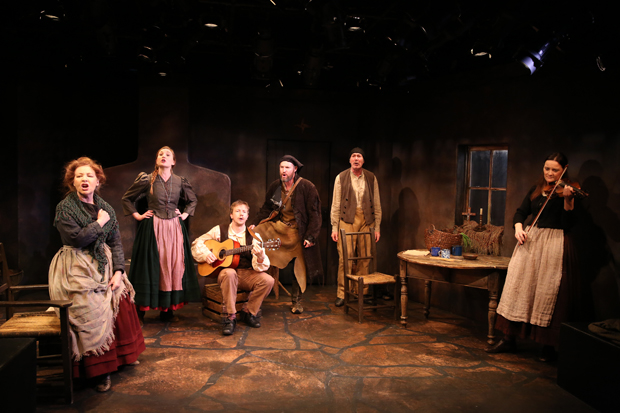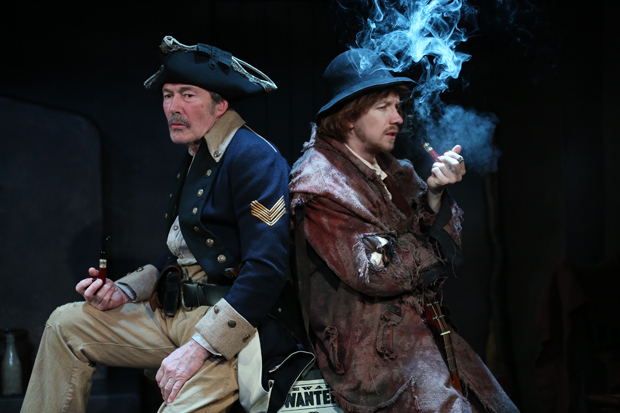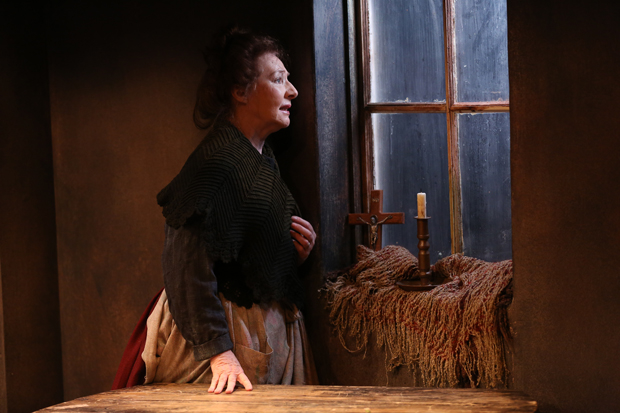Three Timeless Human Stories Emerge From Three Small Irish Masterpieces
The Irish Rep gives us Masterpiece Theater, shamrock style.

(© Carol Rosegg)
Three Small Irish Masterpieces is exactly what it claims to be. Putting the word "Masterpieces" in the title seems to set an impossibly high bar for an evening of one-act plays. And yet the Irish Repertory Theatre clears it (and then some) in this delightful excursion to Éire that packs more dramatic red meat into 75 minutes than most plays can achieve in much longer formats.
That may not be surprising when working with playwrights like Lady Gregory and W.B. Yeats, who collaboratively penned the first play, The Pot of Broth. It’s a light-hearted comedy about a poor tramp (David O'Hara) that wanders into the home of John (Colin Lane) and Sibby (Clare O'Malley), as if he were a stray cat looking for food. And as played by O'Hara, he’s just as charming, seducing his hosts with a prodigious gift of gab that earns him his meal. Get this guy a job on QVC!

(© Carol Rosegg)
The Rising of the Moon, by Lady Gregory, is the second play. It concerns a late-night encounter between a Sergeant in his majesty's army (a surefooted Lane) and a poor balladeer (an enigmatic Adam Petherbridge). It's 1798 and rebellion rages. The sergeant is on the lookout for a fugitive rebel leader and the balladeer says he’s seen him — and that he's not to be trifled with.
The third play, Riders to the Sea, takes us to an island off Ireland's west coast. It was written by J.M. Synge, whose travels in the Aran Islands were the subject of a solo show at the Irish Rep last summer. This dramatic look into the lives of one family of islanders is considerably more gripping. It tells the story of Maurya (a heartbreaking Terry Donnelly), a mother who has lost most of her sons to the fearsome sea at the beginning of the play. Still, her one surviving son, Bartley (Petherbridge), is about to embark for the Galway Fair to sell some horses. His sisters, Nora (O'Malley) and Cathleen (Jennifer McVey), pray that no harm befalls him.
The acting is central to these intensely human stories, and director Charlotte Moore allows her cast to work their magic. James Morgan's set depicts a cozy Irish cottage, which lighting designer Michael Gottlieb atmospherically transforms into a lookout post for the second play. Linda Fisher's costumes are the star design element: They all have an antique handmade quality, stitched together from heavy, itchy fabrics. In the third play, we can practically feel the damp saturating every garment. This may have something to do with a well-placed sound cue that allows us to hear the rain raging outside the windows of the cottage. Unfortunately, a later cue that sounds like the wail of a Martian banshee feels like it belongs in another play. Moore might have benefited from the insight of a legitimate sound designer for this crucial moment.

(© Carol Rosegg)
Truly, the soundscape of Three Small Irish Masterpieces is at its best when coming from the voices and instruments of this talented cast. The show opens with Petherbridge strumming an acoustic guitar and singing a mischievous and inviting rendition of "The Beggarman's Song," which is the perfect overture to the first play. By contrast, the finale has the cast intoning a distinctly minor key. Just like the Greeks, the Irish are fatalists when it comes to tragedy, and an evening of masterpieces would be remiss without it.
But you know what you're in for when you go to a show like this — and you really should go.








